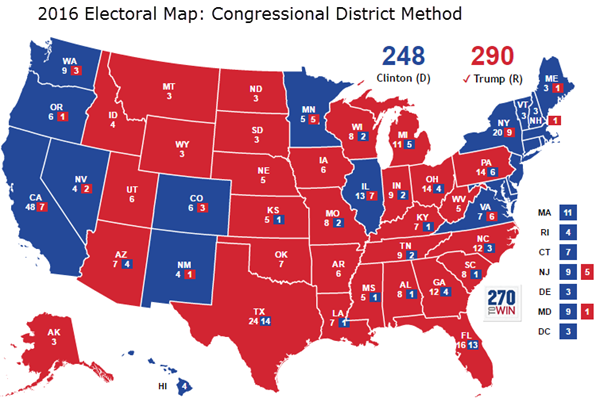Gaming the Electoral College 2017
By 270toWin Staff
January 26, 2017
As first reported by Political Wire (subscription required for this particular article; a political feed well worth following even if you aren't a member), Republicans in Minnesota, New Hampshire and Virginia have introduced legislation this week to modify the winner-take-all allocation of electoral college votes in their states. All three states were won by Clinton in 2016 and have been won by Democrats for at least the last three presidential elections. It will not surprise you that these proposals would benefit the Republican nominee in future elections should the Democratic streak continue.
All three bills would shift the state from winner-take-all to what is known as the congressional district method. In this method, the winner of the popular vote in the state receives 2 electoral votes, with one electoral vote awarded based on the popular vote result within each congressional district. In 2016, Donald Trump would have won 12 electoral votes in these three states if the rules had been in place.
Legislation to manipulate the electoral college vote seems to arise regularly between elections, and is almost always partisan in nature. For example, while proponents of the current bills will likely claim they are 'fairer', Republicans in Nebraska have repeatedly tried to revert back to winner-take-all since Barack Obama won an electoral vote there in 2008. 'Fairer = benefits me' when it comes to this legislation.
Unintended Consequences: It is worth noting the risk associated with this kind of legislation, as things change. For example, in 2013, Pennsylvania Republican State Senator Dominic Pileggi introduced a bill that would change the state’s allocation to roughly reflect the popular vote. This proposal was clearly meant to benefit his party, which had just lost its 6th consecutive presidential election. Mitt Romney would have won 8 of the state’s 20 electoral votes under Pileggi’s plan. Fast forward to 2016, the first election the new rules would have been in place. Donald Trump broke the Democratic winning streak. This legislation would have cost him 9 electoral votes.
Here's how the electoral map would have turned out in 2016 had every state used the congressional district method:
Coming Soon: We're putting the final touches on the 2016 update to our Gaming the Electoral College feature, which explores a number of alternative methodologies that have been proposed over the past 12 years or so.


